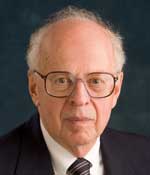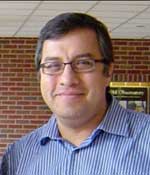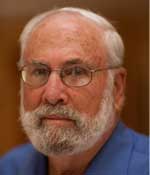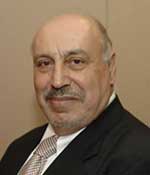View from the Chair
Harvey Newman
Welcome to this first issue of the 2011 FIP newsletter, and to our new Editor, Ernie Malamud. We look forward to a very proactive year on the international physics front, reflected in the informative and in some cases provocative articles in this and future issues.
The inherently international character of science and the importance of unrestricted collaboration, communication and travel are recognized throughout the APS, and are embodied in the fact that nearly a third of the APS members reside outside the U.S. It is a tradition of FIP, notably established by past Chairs Lerch, Winick, Ozaki, and Koller, to strongly engage in international issues, and to promote and defend science in the international arena, as well as open communication and equal access to information and education, diversity, gender equality, and the freedoms and basic human rights that make global scientific progress possible.
APS President Barry Barish has emphasized the importance of international issues, and the APS leadership has moved rapidly to better serve its membership with a global perspective: by expanding the number of International Councillors and moving to increase international representation on APS Committees, and by initiating Physical Review X (prx.aps.org), a global online open-access journal covering all of physics. FIP and the Committee on International Scientific Affairs (CISA) chaired by Karsten Heeger, have begun work on making APS meetings more accessible to its global membership through electronic communication techniques.
We on the FIP Executive Committee look forward to working with the FIP membership, the Office of International Affairs (OIA) led by Amy Flatten, CISA and the APS leadership, to build on FIP's traditions, work to strengthen the engagement with the APS' international membership, and help make some of the initiatives mentioned above a success.
New Slate of FIP Officers
A new slate of officers was installed in January, with the chair line moving one step forward. I welcome the new members of the Executive Committee: Sergio Ulloa (Vice-Chair), Physics and Astronomy, Ohio University; Carl Akerlof, Department of Physics, University of Michigan at Ann Arbor; and Eugene Chudnovsky, Department of Physics and Astronomy, CUNY-Lehman College. Ulloa’s 4-year term and Akerlof and Chudnovsky’s 3-year terms began January 1, 2011.

Carl Akerlof

Eugene Chudnovsky

Sergio Ulloa
I take this opportunity to thank Noemie Koller, now our Past Chair, for her dedicated leadership and guidance throughout the last year, as well as her sensitive handling of a number of difficult international issues that arose. I'd also like to congratulate her on winning the Nicholson Medal, for her career-long commitment to mentoring and fostering the careers of young physicists, and for her leadership as a scientist and humanitarian promoting international freedom and gender equality (see article in this newsletter).
FIP is very fortunate indeed to have Noemi Mirkin, Biophysics Department at the University of Michigan, who continues to serve as Secretary/Treasurer. We are highly indebted to Noemi for her many years of service in managing the Forum's finances and the many aspects of its business matters.
Herman Winick, our FIP Councillor (and FIP Chair in 2007), continues to provide dynamic leadership on a range of international issues, including human rights, and to provide guidance, advice and creative ideas on ways to improve on FIP's service to the international science community.
FIP Activities in 2011
One of the major undertakings of FIP is the organization of sessions at the March and April meetings. This year we have very interesting and informative invited sessions on a wide-ranging set of issues. These are described in accompanying articles in this newsletter.
We welcome and congratulate the new APS Fellows (see article in this newsletter) and congratulate them on their achievements in physics, as well as their dedication and leadership to science education and outreach, promoting international collaborations, and human rights advocacy. We will present their certificates at the meeting they attend, either in March or April.
I would also like to thank Vasudevan Lakshminarayanan for his leadership of CISA, in which the FIP chair line is active, through 2010.
There are several important and prestigious APS prizes, awards, medal and lectureships with which FIP is closely associated. I encourage FIP members to nominate truly outstanding colleagues and thus recognize their contributions to our field.
- The Andrei Sakharov Prize. Nominations for the 2012 prize are due July 1, 2011. Details are at http://www.aps.org/programs/honors/prizes/sakharov.cfm
- The John Wheatley Award. The award is presented biennially, every odd-numbered year, at the general meeting of the American Physical Society. See http://www.aps.org/programs/honors/awards/wheatley.cfm for details on nominations for the 2013 award.
- International Travel Grant Awards. Members of FIP, as one of the sponsoring APS units are eligible to apply.
- The Nicholson Medal (see the article about Noemie Koller, in this newsletter). The deadline for submission of nominations for the 2011 prize is July 1, 2011.
- The Society continued to bring international physicists to speak at APS meetings through both the Marshak and Beller Lectureship Awards. The Marshak Lectureship, endowed by Ruth Marshak in honor of her late husband and former APS president, Robert Marshak, is to provide travel support for physicists from "developing nations or the Eastern Bloc". In 2010, the Marshak Awardee represented the Palestinian Authority. The Beller Lectureship was endowed by Esther Hoffman Beller for the purpose of bringing distinguished physicists from abroad as invited speakers at APS meetings. In 2010 the Beller Awards were presented to physicists representing Israel and France.
Andrei Sakharov Prize
 The Sakharov Prize recognizes outstanding leadership and/or achievements of scientists in upholding human rights. The prize is named in recognition of the courageous and effective work of Andrei Sakharov on behalf of human rights, to the detriment of his own scientific career and despite the loss of his own personal freedom. The Prize is endowed by contributions from friends of Andrei Sakharov. The 2010 prize was awarded to Herman Winick, Joseph Birman, and Morris (Moishe) Pripstein.
The Sakharov Prize recognizes outstanding leadership and/or achievements of scientists in upholding human rights. The prize is named in recognition of the courageous and effective work of Andrei Sakharov on behalf of human rights, to the detriment of his own scientific career and despite the loss of his own personal freedom. The Prize is endowed by contributions from friends of Andrei Sakharov. The 2010 prize was awarded to Herman Winick, Joseph Birman, and Morris (Moishe) Pripstein.
FIP is very pleased and honored that one of the 2010 awardees of this prize is FIP Councillor Herman Winick. The award citation reads:
“For tireless and effective personal leadership in defense of human rights of scientists throughout the world.”
John Wheatley Award
 The 2011 Wheatley Award, to honor and recognize the dedication of physicists who have made contributions to physics in the Third World, has been awarded to Migual Jose Yacaman of the University of Texas, Austin. Professor Yacaman will receive his award at the prize session at the April meeting.
The 2011 Wheatley Award, to honor and recognize the dedication of physicists who have made contributions to physics in the Third World, has been awarded to Migual Jose Yacaman of the University of Texas, Austin. Professor Yacaman will receive his award at the prize session at the April meeting.
The award citation reads:
“For the great impact that his efforts as an influential promoter of the development of physics have had, not only in Mexico, but also in Latin America and beyond.”
The John Wheatley Award was established in 1991 with the support of the Forum on International Physics to honor and recognize the dedication of physicists who have made contributions to the development of physics in countries of the third world.
The award consists of a stipend of $2,000 and a certificate citing the contributions made by the recipient.
Overseas Physics Groups
In its work on international issues, FIP welcomes its continuing partnership, begun in 2006 under then-FIP Chair Irving Lerch, with several overseas physics groups, including:
- American Chapter of the Indian Physics Association (ACIPA), India; Surajit Sen, President.
- Association of Korean Physicists in America (AKPA), Korea; Ho Jung Paik.
- Overseas Chinese Physics Association (OCPA), China; Bill Weng, President.
- Iranian-American Physicists (IrAP) Network Group; Hamid Javadi (JPL)
Promoting and Defending International Science and Human Rights
International physics collaborations, whether one-on-one, among small groups, or as part of major science projects such as SESAME and the Large Hadron Collider program, are shining all-too-rare examples of cooperation across borders that promote not only the progress of science, but mutual understanding and world peace. Recent challenges to international cooperation and violations of human rights continue. One of the most shocking recent examples is the assassination of Iranian physicists working on SESAME during the past year: nuclear physicist Majid Shahriari last November, and string theorist Massoud Ali-Mohammadi (a member of the SESAME Council from Iran) in January 2010.
Other recent events violations include the house arrest of the wife of Nobel Peace Prize winner Liu Xiaobo and many other dissidents in China since October, the house arrest of Nobel Peace Prize winner and opposition leader ElBaradei and the shutting down of the Internet to stifle communications during the unrest in Egypt, at the time of this writing.
FIP will continue to work together with Amy Flatten and Michele Irwin of the Office of International Affairs and the APS leadership to inform our members of these issues, and to raise awareness whenever violations occur. Building on its traditions, FIP will continue to work as needed to uphold the principles of open communication and cooperation without borders, to promote equality of access globally to the knowledge of physics, and to defend human rights both within and beyond the bounds of the scientific community.
Harvey Newman is a Professor at Caltech, a high-energy physics experimentalist and Chair of the FIP. He is also engaged in work on Digital Divide issues in many regions of the world. During 2010, as FIP Chair-Elect and FIP Program Chair he organized the FIP sessions for the APS Spring 2011 meetings.

Disclaimer - The articles and opinion pieces found in this issue of the APS Forum on International Physics Newsletter are not peer refereed and represent solely the views of the authors and not necessarily the views of the APS.
